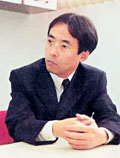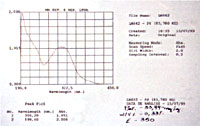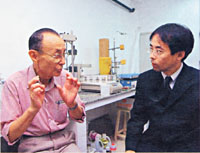 |
| Bee Square HOME | The Miraculous Life of Bees | A Surprising Story about Bees | Look into a honeycomb! | An Introduction to Beekeeping |
| Honeybee Restaurant | Beekeeping Reports from Around the World | Fairy Tales and Picture Books about Bees Story Collection | News From the Bee Farm | Links |
|
|
for specific research on plants.
I also learned of the leading-edge research being done in Brazil today. I asked Dr.Osmar Malaspina of UNESP (Universidade Estadual Paulista) to talk about the research being done at the university on the types of plants honeybees collect nectar from to make propolis. He began, "Brazil is a very large country with much vegetation, so it is extremely difficult to determine which plants are being used." With this, it became clear to me that apiarists, the people who most closely work with bees, can play a key role in discovering the origin of the useful ingredients of propolis. Dr.Osmar Malaspina also agreed with the need for beekeepers to work to develop this knowledge, since they are the people who understand the differences in propolis quality and often work in wooded areas. When I offered to have someone from this company join his team, he warmly accepted. Professor Katsuhiro Konnno, a researcher from Japan, is currently studying bees at this university. Joint research by Professor Katsuhiro Konnno and Yamada Bee Farm began in January 2000. He studies honeybee behavior and analyzes plants to determine their relationship to specific characteristics appearing in propolis. This research will lead to better propolis as well as to the ability to identify and characterize different types of propolis. |
Yamada Bee Farm has studied Professor Young K.Park's Internet-based papers as valuable research material, and his activities are of great interest to many. From the perspective of the plants from which propolis is derived, I began our conversation: "Many people have found propolis useful as a nutritional supplement, and if this usefulness derives from plants, then shouldn't it be possible to produce better quality propolis by understanding which plants these are? Also, in rare cases people are allergic to propolis. Isn't this an allergy to the source plant? If so, if the plant were known, wouldn't it be possible to use propolis that was not derived from that plant to avoid an allergic reaction?" Professor Young K.Park stated, "That is the focus of my present research--where propolis comes from, what kind of trees." He then explained his latest findings on the relationship between the anti-bacterial effects of propolis and differences in the source plants.
"In other words, we are working to determine the effective ingredients. And to discover the origins--the plants from which propolis derives--which means clarifying which trees it comes from. The only problem is that in Brazil the flora is completely different from one place to another. So now we have to research every single plant," he laughed. With this conversation, Professor Young K.Park once again reinforced my impression that he is indeed a leading researcher on propolis. |
Yamada Bee Farm (Kagaminocho Pref. Okayama)
Copyright(C)2005 Yamada Bee Farm All Rights Reserved.
|





